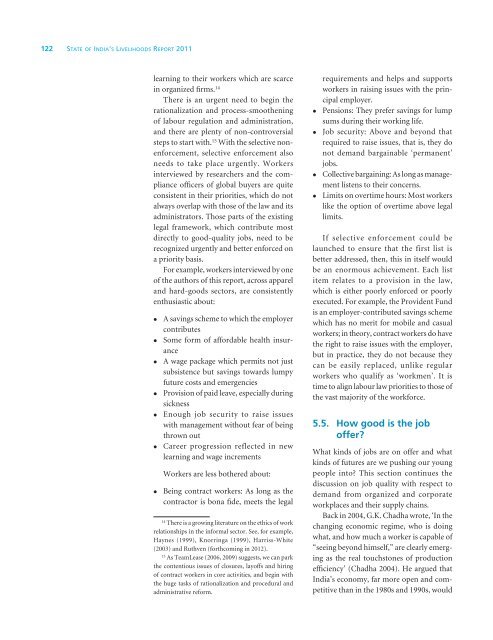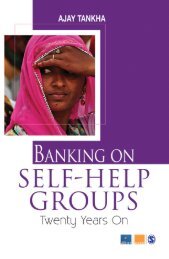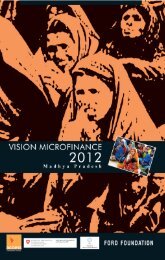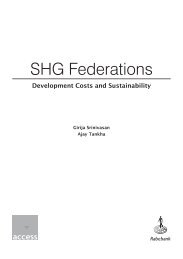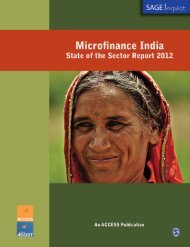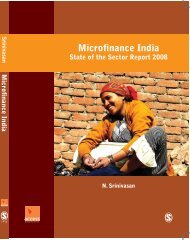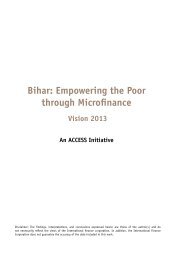SOIL Report 2011 - ACCESS Development Services
SOIL Report 2011 - ACCESS Development Services
SOIL Report 2011 - ACCESS Development Services
- No tags were found...
You also want an ePaper? Increase the reach of your titles
YUMPU automatically turns print PDFs into web optimized ePapers that Google loves.
122 State of India’s Livelihoods <strong>Report</strong> <strong>2011</strong>learning to their workers which are scarcein organized firms. 14There is an urgent need to begin therationalization and process-smootheningof labour regulation and administration,and there are plenty of non-controversialsteps to start with. 15 With the selective nonenforcement,selective enforcement alsoneeds to take place urgently. Workersinterviewed by researchers and the complianceofficers of global buyers are quiteconsistent in their priorities, which do notalways overlap with those of the law and itsadministrators. Those parts of the existinglegal framework, which contribute mostdirectly to good-quality jobs, need to berecognized urgently and better enforced ona priority basis.For example, workers interviewed by oneof the authors of this report, across appareland hard-goods sectors, are consistentlyenthusiastic about:• A savings scheme to which the employercontributes• Some form of affordable health insurance• A wage package which permits not justsubsistence but savings towards lumpyfuture costs and emergencies• Provision of paid leave, especially duringsickness• Enough job security to raise issueswith management without fear of beingthrown out• Career progression reflected in newlearning and wage incrementsWorkers are less bothered about:• Being contract workers: As long as thecontractor is bona fide, meets the legal14There is a growing literature on the ethics of workrelationships in the informal sector. See, for example,Haynes (1999), Knorringa (1999), Harriss-White(2003) and Ruthven (forthcoming in 2012).15As TeamLease (2006, 2009) suggests, we can parkthe contentious issues of closures, layoffs and hiringof contract workers in core activities, and begin withthe huge tasks of rationalization and procedural andadministrative reform.requirements and helps and supportsworkers in raising issues with the principalemployer.• Pensions: They prefer savings for lumpsums during their working life.• Job security: Above and beyond thatrequired to raise issues, that is, they donot demand bargainable ‘permanent’jobs.• Collective bargaining: As long as managementlistens to their concerns.• Limits on overtime hours: Most workerslike the option of overtime above legallimits.If selective enforcement could belaunched to ensure that the first list isbetter addressed, then, this in itself wouldbe an enormous achievement. Each listitem relates to a provision in the law,which is either poorly enforced or poorlyexecuted. For example, the Provident Fundis an employer-contributed savings schemewhich has no merit for mobile and casualworkers; in theory, contract workers do havethe right to raise issues with the employer,but in practice, they do not because theycan be easily replaced, unlike regularworkers who qualify as ‘workmen’. It istime to align labour law priorities to those ofthe vast majority of the workforce.5.5. How good is the joboffer?What kinds of jobs are on offer and whatkinds of futures are we pushing our youngpeople into? This section continues thediscussion on job quality with respect todemand from organized and corporateworkplaces and their supply chains.Back in 2004, G.K. Chadha wrote, ‘In thechanging economic regime, who is doingwhat, and how much a worker is capable of“seeing beyond himself,” are clearly emergingas the real touchstones of productionefficiency’ (Chadha 2004). He argued thatIndia’s economy, far more open and competitivethan in the 1980s and 1990s, would


